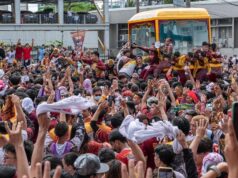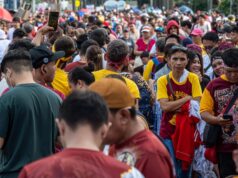High court says no decision yet on Marcos election suit
THE SUPREME Court yesterday belied a newspaper column that said it had favored the son of the late dictator Ferdinand E. Marcos in his vice presidential election protest.
“There is no definite voting yet or anything that happened in that particular case,” Chief Justice Lucas P. Bersamin told reporters on the sidelines of a summit on the Dangerous Drugs Law.
A column by Federico D. Pascual, Jr. published in The Philippine Star said the high court, acting as the Presidential Electoral Tribunal, had voted 8-6 in favor of Mr. Marcos.
Mr. Marcos lost the vice presidential race by a hair to Ms. Robredo, who is now halfway through her term.
“I cannot confirm or deny that because he must know more than I do. That’s the bad part about it,” Mr. Bersamin said.
The tribunal has deferred acting on the results of a ballot recount in connection with Mr. Marcos’s 2016 electoral protest court spokesman Brain Keith F. Hosaka said this week, without giving a reason.
The Constitution mandates the high court, sitting as an electoral tribunal, to resolve disputes involving the presidential and vice presidential races.
Justice Alfredo Benjamin S. Caguioa earlier submitted a report on the ballot recount in three pilot provinces where massive cheating allegedly occurred.
Mr. Marcos identified the provinces as Iloilo, Negros Oriental and Camarines Sur, which had a total of 5,415 voting precincts in the May 2016 elections.
Mr. Bersamin said last month they were treading carefully in the electoral protest because it was “a matter of public interest.”
In August, Mr. Marcos asked the tribunal to hasten his electoral protest by directing hearing commissioners to set a preliminary conference because the revisions in the pilot provinces had been finished as early as February.
The tribunal in July deferred action on his motion to probe alleged vote-rigging in three more provinces in Mindanao.
It also denied for being filed prematurely the motion of Ms. Robredo to resolve all pending incidents after the revision of ballots.
Mr. Marcos narrowly lost the vice presidential race to Ms. Robredo, who is now halfway through her term.
Ms. Robredo early this week said the high tribunal’s decision on the case will be a test of the country’s electoral process and justice system.
She cited the need to trust the system because this was the electoral process that had given her and other officials of the country the victory in the May 2016 elections.
In the Philippines, the president and vice president are elected separately and may come from different parties. — Vann Marlo M. Villegas



